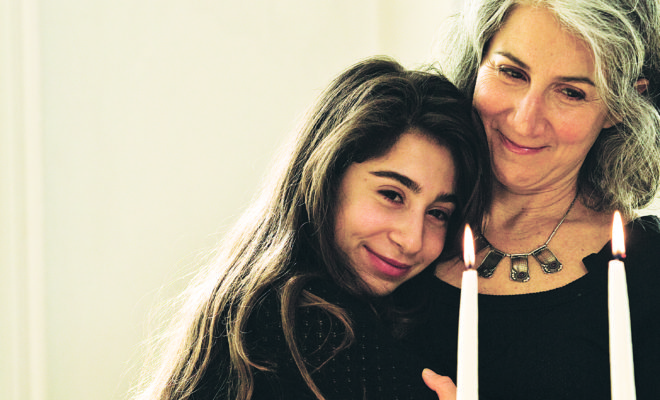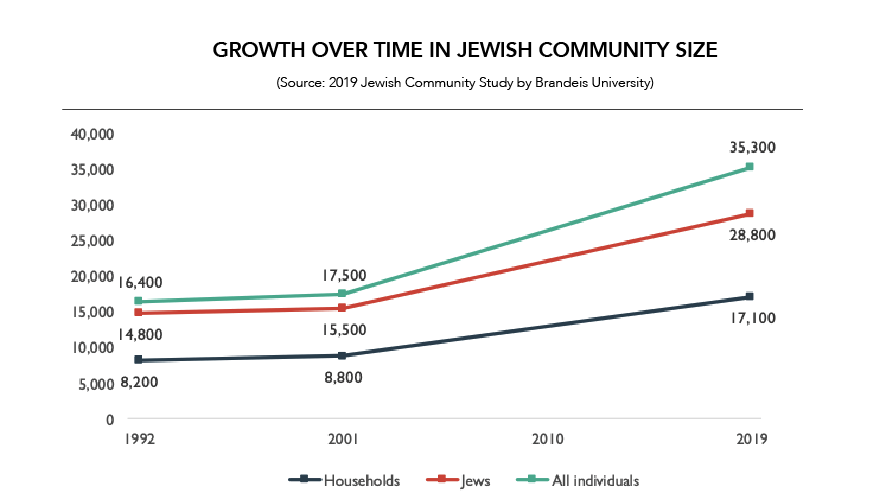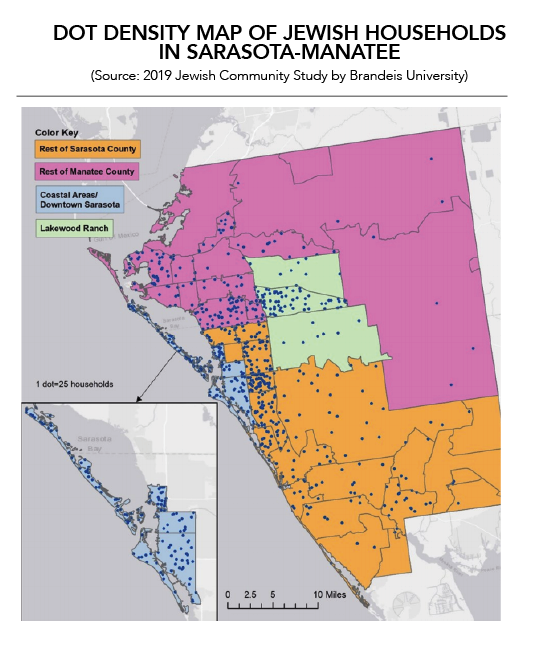
Feature
A Community Growing Bigger and Younger
The Jewish Federation of Sarasota-Manatee Looks in the Mirror
By Sylvia Whitman
Good data yields better programs. This year, the Jewish Federation of Sarasota-Manatee (JFSM) contracted Brandeis University in Massachusetts to survey the local Jewish population, and results from the yearlong study are in.
“The biggest happy surprise is that our community is growing by leaps and bounds,” says Kim Mullins, JFSM’s COO. Since the last study in 2001, the Jewish population in the two Gulf Coast counties has doubled, to about 35,300, including 3,400 Jewish children. Jews, about 2.2% of U.S. residents, now make up 3.6% of the Sarasota-Manatee population.
“Certainly, the Gulf Coast population as a whole has grown,” Mullins says. “But the rate of growth for the Jewish community is almost two times that.”
Why the influx? “We attribute it to same reasons everybody wants to live here—arts, culture, education, lifestyle, sports, pickleball!” explains Mullins. “The Jewish community in particular is drawn to this region’s strong cultural and educational resources.”
Although Jews from colder climates have traditionally seen Sarasota-Manatee as a retirement destination, the percentage of Jewish residents under age 64 has increased since 2001. “More young professionals are coming to provide services to people who are retiring,” says Mullins. These still-working newcomers, many of them doctors and lawyers, are often raising families, and the doubling of the under-18 cohort has contributed to lowering the community’s mean age.
As a corollary, more than 80% of Sarasota-Manatee Jews spend more than nine months of the year here. “We had thought we had a larger subset of snowbirds,” says Mullins.
Another unexpected finding, says JFSM CEO Howard Tevlowitz, lies in the distribution of the Jewish population. “We suspected that our numbers had grown in Lakewood Ranch, and yes, about 11% of the two counties’ Jewish population lives there. The surprise is that more than 24% have settled in University Park north into Manatee.”
Anyone interested in a fuller portrait of the Jewish presence in Sarasota-Manatee can find the Brandeis report on the JFSM website (jfedsrq.org/communitystudy).

FROM INFORMATION TO ACTION
To use this data, JFSM is assembling a strategic planning committee, Tevlowitz says. The findings largely support the current direction of the organization. The study confirms, for instance, that JFSM’s Larry & Mary Greenspon Family Campus for Jewish Life is in the right place—580 McIntosh Road—central to three large demographic growth areas.
About a decade ago, JFSM switched from a general membership to a fee-for-service model that facilitates programming responsive to demand. According to Tevlowitz, two words sum up JFSM’s operating philosophy: engagement and connectivity. The federation aims to offer programs across the lifespan, bridging age groups.
This seems particularly appropriate now that the local Jewish community, as the Brandeis study underscores, is becoming more multigenerational. As part of the “reimagining” of the campus currently under way, the Hershorin Schiff Community Day School (K-8), about 300 kids strong, will relocate onto the JFSM grounds in June 2021. JFSM also participates in the PJ Library, an international program of the Harold Grinspoon Foundation that sends free Jewish-themed books and music to children on a monthly basis. Already, the study shows, JFSM’s PJ Library has given the Federation “about 70% in-reach to families with kids from 0 – 11, one of the highest saturation rates in the country,” says Mullins.
To engage adults, “we’ve made concerted efforts over last two years to bring in hundreds of volunteers,” says Tevlowitz.
Like other local organizations, adds Mullins, JFSM is working to have the younger demographic represented in decision making, and eventually in top leadership. “We may not have everybody,” says Tevlowitz, “but work gets done in committees that bubbles up to the board.”
The study recommends that JFSM could be doing even more outreach—to Jews and non-Jews alike. About 8% of respondents labeled themselves “immersed” in all aspects of Jewish life; the remainder split almost evenly between minimally and moderately engaged. Tevlowitz says that JFSM plans to build on its successful mothers-only and fathers-only trips to Israel. “It reignites their Judaism,” he says. “Moms come home fired up.”

Other Brandeis study findings emphasize the weaving of the Jewish community into the fabric of the region as a whole. While almost 70% of Sarasota-Manatee Jews report that at least half of their closest friends are Jewish, 48% of marriages involve a spouse of another faith. Although lower than the national intermarriage rate, the local one has almost tripled since 2001.
JFSM wants to share Jewish values widely, overcoming divides. “We’ve always welcomed others,” Mullins says. “Our programs are open to those of all backgrounds and faiths.”
She adds that as the campus expansion continues, JFSM will likely add more high-quality cultural programs. A performing arts center, with about 2500 square feet exhibition space, will host rotating exhibits from around country, as well film and book festivals. Space will give JFSM more opportunity to work with established partners such as the Perlman Music Program/Suncoast.
Tevlowitz adds that JFSM has cultivated ties with other groups, from the NAACP to Unidos Now. It works with the nonprofit Embracing Our Differences. “We’re a small minority,” explains Tevlowitz, “and we understand what that feels like.”
JFSM has also brought over 90 leaders from the community—from religion, business, education, philanthropy, government, and more—to Israel. “You build community not through big events but by building relationships,” Tevlowitz says.
He points with pride to programs like Classrooms Without Borders. Through this nationwide initiative, this year JFSM sent five teachers from Gulf Coast public and diocese schools to Poland; with other participants from across the country, they learned not just the lessons of the Holocaust but about diversity education. Each year JFSM also organizes a mission to Israel, the focus (security, for instance, or economic development) determined by participant interest and expertise.
“The best outcome is that we travel together. We learn from each other. It’s very hard to dislike someone you get to know very well. There’s zero stereotyping when you come back from trips like this,” says Tevlowitz.
The Brandeis checkup confirms the good health of the local Jewish community. In preparing for this close inspection, JFSM “set up to proactively react to this information,” Tevlowitz says. “We should be proud. But as our demographer said to us yesterday, ‘Now the hard work begins.’”



You must be logged in to post a comment Login